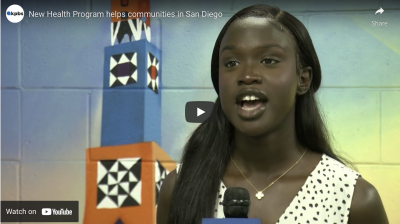San Diego Refugee Communities Coalition (SDRCC), a collective of refugee and immigrant community based organizations, was recently featured on KPBS for being the first to create a behavioral health initiative and support peer-based, non-clinical mental health programs. The innovative initiative provides free, specialized services for immigrants, refugees and asylum seekers in the region and has become a model for other states. In the past year alone, the initiative has helped over 2,000 people.
“Girl Talk”, organized by Southern Sudanese Community Center of San Diego, is one of several free, specialized mental health programs for refugees supported by SDRCC. As “Girl Talk” participant and South Sudanese daughter of refugees, Nyaduoth Gatkuot describes, “These are women who I see myself in. So it’s basically kind of like a mirrored experience when I am in that space.” I see people who are me and I’m able to empathize with what they’re going through and sympathize as well.” According to Gatkuoth, sympathy and empathy are just part of what’s offered through the group. “They talk about housing issues, they talk about food insecurity issues, and so on and so forth,” she said. “So, what I think this program has done: it’s expanded what mental health means.”
The program’s counselors speak 13 different languages and are all refugees or immigrants themselves. “People feel comfortable to talk to somebody who can understand the culture, who speaks their languages,” said License to Freedom CEO Dilkwhaz Ahmed. Her organization has taken the lead on providing mental health services to refugees in San Diego.
As Ahmed mentions, the “Girl Talk” model is starting to grow and more Southern Sudanese women across the U.S. are coming together to talk about their mental health. “Girl Talk” expanded surprisingly as a result of turning to online group therapy during the COVID-19 pandemic. “Girl Talk” is now in the Midwest where there is a large South Sudanese presence and has reached young women in Nebraska, Iowa, North Dakota, South Dakota.
License to Freedom CEO Amhed said expanding the refugee coalition’s impact is exactly what she wants to see for the Behavioral Health Initiative. “Other organizations can come and take some of the lessons of what works and why this program is successful,” she said, dropping a hint at what the secret for their growth has been: “It’s because it came from the people themselves.”
SDRCC receives backbone organizational support from the Center for Community Health’s Refugee Health Unit, housed under the Altman Clinical & Translational Research Institute.

